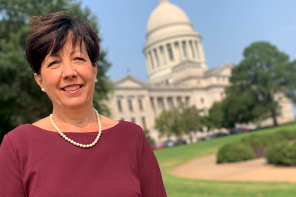Last week, the New York Times called attention to an apparent new strategy in the creationism intelligent design movement.
Since Judge John E. Jones ruled the concept of intelligent design as revamped creationism in 2005’s Kitzmiller v. Dover trial, pro-ID organizations like the Discovery Institute have been lobbying state lawmakers to pass legislation advocating a “teach the controversy” approach to science education. In the past couple years, they have gotten legislators to introduce bills in states such as Missouri, Florida, Alabama, Mississippi, Oklahoma and Louisiana advocating for academic freedom to teach “the controversy” regarding scientific issues like evolutionary theory. (Note: In the scientific community, there is no controversy over the reality of evolutionary processes.) So far, only Louisiana has taken the bait and passed an academic freedom law.
Now it seems the reality of climate change is the new target. Resolutions similar in wording to the anti-evolution bills have cropped up in state houses questioning the validity of climate change and calling for a “teach the controversy” approach.
It’s an interesting strategy. By expanding their argument to include climate change, they’re saying that they aren’t anti-evolution—they’re just anti-scientific dogma.
“There is a lot of similar dogmatism on this issue,” Discovery Institute’s Jonathan West told the NYT, “with scientists being persecuted for findings that are not in keeping with the orthodoxy. We think analyzing and evaluating scientific evidence is a good thing, whether that is about global warming or evolution.”
As the New York Times article suggests, the strategy’s roots are in the 2005 Cobb County, Ga. case, in which the school board there put warning stickers on biology books, saying evolution is “not just a theory, not a fact.” A judge struck down the warning stickers as unconstitutional because it unfairly targeted evolution for special scrutiny:
After that, said Joshua Rosenau, a project director for the National Center for Science Education, he began noticing that attacks on climate change science were being packaged with criticism of evolution in curriculum initiatives.
Last week South Dakota passed a resolution calling for the “balanced teaching of global warming in public schools.”
But a quick read of the original House version of the legislation reveals the woeful ignorance of lawmakers who introduced the bill—which should give pause to anyone who thinks these folks should be making policy decisions regarding the education of the state’s children. Steven Salzberg points out the ridiculously uninformed assertions in the initial language, which includes a mention of astrology as one of the factors involved in the creation of weather patterns. (Hat tip to Ed Brayton at Dispatches from the Culture Wars.):
Wow! The South Dakota legislature has declared, by majority vote, that the ancient pseudoscience of astrology “can effect world weather”! Astrology, of course, is a superstitious belief that the movements of stars and planets can affect our daily lives here on Earth, a belief that has no basis in science. Some people—including, apparently, the South Dakota legislature—still take it seriously, although most view astrological forecasts as light entertainment…
And we mustn’t ignore “thermological” causes. Do the wise SD legislators realize that thermology is the analysis of detailed infrared images of the human body? I suppose all our warm bodies also affect world weather—it must be true, because the SD legislature says so. And “interrelativity”! They must mean “interrelatedness”, but how nice to bring in Einstein’s theory here. I can’t quite grasp how relativity has anything to do with global warming, but I probably don’t know as much physics as the South Dakota legislators.)
The language about astrology and thermology was removed from the bill’s final version, but not the word interrelativity.




